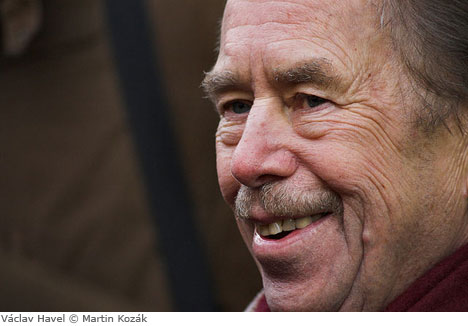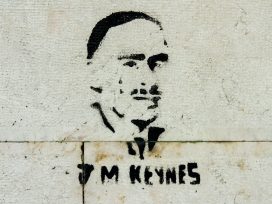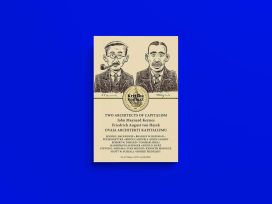Havel's paradox comes to an end
At the recent NATO summit, several countries – including Slovakia and the Czech Republic – were invited to join. Martin Simecka has observed the action behind the scenes of the official programme.
The empty streets of Prague reminded me of the 1980s, when it used to look like this every night. However, on November 20, 2002, it was late morning.
The illusion stemmed from an event that could be called the “Havel Paradox”: in an effort to take back what the last century of war had stolen, the former prisoner of the Communist regime had invited to Prague the elite of Western civilization for the NATO summit. The inhabitants of Prague chose to take the day off.
The summit was expected to offer answers to such questions as what is Western civilization, what are its boundaries and how should they be defended. In the Palace Hotel I found the answer to the first question. A marble bathroom reminded me of a temple. The West has been obsessed by physical hygiene since antiquity; Christianity merely added the purification of the soul.
Fifteen minutes later I was a changed man. Dressed in my black suit, I descended to the hotel lounge where I gave a hug to an Eastern European friend from the 1990s. I hadn’t seen the Bulgarian Ivan Krastev since a conference in London five years ago where we’d talked long into the night about the death of reason.
“I told you so,” I said. He introduced me to Nadezda Mihajlovna and Petar Stojanov. If they hadn’t lost the elections, they – and not that curious Tsar Simeon II – would have received the invitation from Lord Robertson to join NATO. As things stand, they were to join us anyway at this conference of the “NATO-mafia” (a term that those determined to convince Western politicians to enlarge the Alliance eastward use ironically).
A van drove us through a half-empty Prague. The driver enjoyed it: “It should always be like this.”
The Sovovy mlyny Museum had been flooded last summer, and on the wall the restauranteurs had left an artistic “flood line” two meters high. The ticket with my table number on it separated me from Adam Michnik and seated me next to Torsten Krauel-Vito, who talked about the crisis in the German press. Václav Havel made five introductory comments, the last of which stated that if we resolve to take action against a state in the name of defending human life, we should pause for a moment “and plumb the depths of our souls to ask ourselves whether or not we’re really doing this as a ‘brotherly help'”. He was referring to euphemism used for describing the Russian occupation of Czechoslovakia and the impending American invasion of Iraq.
The applause wasn’t as much for Havel’s words as for Havel himself. Julia Finley was first off her chair to give him an ovation, and we all joined in. In the following two days no one returned to this remark, but I explained to Kraeul-Vito what a powerful symbol Havel – a master of semantics – used. The lunch consisted of a bit of salad and roasted veal.
The Sovovy mlyny Museum lies near the River Vltava, on whose banks some of the refuse of Western civilization collects: apparently the Museum was saved from it by flooding the whole first floor with clean piped-in water. I liked this idea so much that, lost in thought, I almost missed the last van home.
In Valdstejn Palace, where the Czech Senate convenes, George Lord Robertson welcomed us, thanked us for our wise advice, kissed Madeleine Albright on both cheeks and disappeared. Embarrassed by such behavior, I turned my eyes toward the ceiling. Big plaster angels were flying around the edges. The conference on the expansion of NATO had begun.
The natural choice for keynote speaker was Zbigniew Brzezinski, whose full-time job is to ponder the state of the world. When delivering his speech he glanced at his watch, and in five minutes managed to work in – among many other things – the arguments for admitting the Ukraine, Georgia and Azerbaijan to NATO.
Next to me sat Czech Senator Jan Ruml, who once shared a cell in Ruzyn jail with my father and his. He drew me a diagram of the way to his office through the labyrinth of the palace’s corridors and invited me for a drink. But with heavy heart I chose the future and stayed to listen to Bruce Jackson: “The year 1989 represented a moral revolution, not a political one, and this we must bear in mind,” he said. Today, all countries in the East cling to Europe more than ever: democracy has a unique opportunity to control them from the North to the whole circumference of the Black Sea. Later it was Bruce Jackson who dragged me off to a pub for a beer. (This was after dinner at ZofÌn where JirÌ Dienstbier entertained me while we were having a smoke with a description of how he’d recently fallen down some steps and cracked his skull, eardrum and several ribs.) We were jammed into a small bar with Michnik, drinking bottled beer and whiskey, when Jackson reprimanded us: “The world needs vision and visionaries, you must speak up!” I immediately felt guilty because I had no vision, but Michnik was more resistant. “I did my best work under Communism, Simecka under Meciar. We’re not visionaries, we just analyze dictatorships,” he said astutely. Jackson pressed on. “So join a commission which I’m just setting up for the liberation of Iraq,” he said, raising his beer in a pledge. “OK then,” we replied, disarmed.
Helena, who was depicted in a Timothy Garton Ash’s book as being behind the Polish miracle called Gazeta Wyborcza, was quizzing Julia Finley. “My father was a politician and my mother was an opera singer,” said Finley. I put my two cents in. “That doesn’t explain your huge influence on American politics.” “Yes it does. My parents educated me to respect values.” She was sincere, but at 2 a.m. it didn’t make sense to try to explain to her how implausible her statement sounded in a pub in Mittel-Europa.
The next day I noted that the 60 people discussing the future of the world
(and hence giving it form) were all white. We may think of ourselves as “white civilization,” but even we sense the tawdriness of the lie. Timothy G. Ash clearly
stated that Europe will have to cope with the Moslem nations in the Balkans,and Madeleine Albright spoke about the Near East waiting for our help. James Woolsey, the former head of the CIA, maintained that democracy will spread regardless of skin colour or religion. All we need to do is democratize the remaining 73 nations. Then there’ll be peace all over the world.
“If truly free, democratic elections were held in Kosovo and Serbia today, they’d probably vote for war,” said Carl Bildt, who not long ago was Prime Minister of Sweden.
All of them were right, yet they contradicted each other – which is what makes these conferences so delightful. “You have to say something,” Helena and I urged Adam Michnik during a cigarette break. “Anti-Americanism has similar features to anti-Semitism and is more dangerous, because we still don’t recognize it as a threat,” said Michnik. “NATO means safety and democracy, yet here in Prague there’s no feeling of euphoria. Except for the young people in the streets expressing their opposition to democracy, the city is deserted. We can’t close our eyes and ignore this.”
Klaus Naumann offered an indirect answer. “Anti-Americanism doesn’t exist in Germany. We Germans just listened to what the Americans kept telling us
since World War II, and became pacifists.” Though he was frowning, this general had a sense of humour.
“I advise Europeans to take part of the money from farm subsidies and buy airplanes. The American press is already complaining about America being forced to play Sparta while Europe plays Athens,” said Woolsey. Martin Butora arrived and, with pathos worthy of the occasion, announced that NATO had invited seven countries, including Slovakia, to join. All applauded us.
While minivans transported us to the Palace Hotel, Constanze Stelzenm¸ller told me how she’d grown up in Spain during Franco’s regime in an enclave of diplomat children. “Until now Spaniards didn’t want to speak openly of their past. But it took even us Germans fifty years,” she assured me.
They drove us from one place to another, feeding us gloriously. An army
of waiters never left my glass half-empty. They feed our bodies so that they can pick our brains, I thought with a twinge of my old paranoia when I found myself back in the marble bathroom. How comfortable and disarming it is, though, to live in Athens, not Sparta.
That evening we entered the Prague Castle through a gauntlet of policemen and metal detectors. I’m always surprised to find out how much metal I carry on me even though I don’t even wear a watch.
In the vestibule in front of the Spanish Hall, the elite of the planet were squeezed in like sardines. I bumped into Lord Robertson, who congratulated Martin Butora and me on Slovakia’s acceptance into NATO. This Lord is a nice fellow, I thought, but in an instant he’d already started speaking to someone else. His bodyguard touched his back gently as if to separate us and to make sure that I wasn’t about to pull a knife. Unfortunately, he couldn’t protect the Lord from tomatoes the next day.
I squeezed in among my Czech friends passing Joschka Fischer, whose sad face is without parallel in politics. Ivan Gabal, Michal Zantovsky and Jan Ruml were talking about the horrors that the Czech Republic will face after Havel leaves politics. “Then you’ll understand our Slovak despair a bit better,” I said maliciously. Václav Klaus was standing several yards away, and if I’m any judge, he seemed rather lonely in the crowd.
The ballet in the Spanish Hall danced on the edge of parody, sympathy and compassion: intrigues, sex, loneliness among the mirrors; lust for power; death wishes – all around was flying feather symbolizing vanity. I wondered if the politicians had a clue as to what Havel had tried to say to them.
The walk to Vladislav Hall was long and enjoyable; guards and attendants lined the corridors. Before his fall, Gustáv Husák used to walk down these corridors, despised and lonely.
“History is full of bastards”,I said to Condoleeza Rice – the first thought that came into my head. “Your Slovak story is fantastic, however”, she answered with a smile as famous as Madonna’s, thanks to the gap between her teeth. She’s right. Everybody loves the Slovak story, since it reminds them of the frog who turned into a princess. Five years ago, who would have dared to kiss her?
At the banquet I was seated next to the elegant Jeanne Kirkpatrick, whose conservativism is as evident on her face as it is on Margaret Thatcher’s. “Do you think Bush has already decided to invade Iraq?” I asked rudely. “I don’t represent the American government,” she snapped. I tried to explain my question. “Isn’t it poetic that one person gets to decide the fate of the world?” “I rather think that he hasn’t decided yet,” she said as if to show forgiveness. “But he’s more like Reagan than his father. He won’t rely on the bureaucrats for answers.”
Across the table sat the quiet Defence Minister of Uzbekistan, whose poor English saved us from a conversation. At the next table sat Colin Powell. I felt like a trophy hunter without any enticing bait. What polite, innocent, interesting remark can one make to a person who’s already won the First Gulf War?
At the moment when the orchestra directed by Kocáb and Pavlicek started to play, Vladislav Hall became a temple. The monumental music filled the space under the vaulting and electrified the air. Lit from underneath by a yellow light, PavlÌcek resembled Mephistopheles. Music raised the entire conference to a level above the horizon, where politicians can’t go; for the sensitive ones, it was a message that, in the end, Art wins. “My father died in this castle twelve years ago,” I told Jeanne Kirkpatrick in a shaky voice. “I believe that it was politics that killed him.” I was surprised at how moved my companion looked.
On my way to the exit, I saw our Prime Minister Mikulás Dzurinda hugging
Silvio Berlusconi. These politicians really like each other. They’re all connected by the happy knowledge that the only reason they’re here is because the voters pushed them here. Dzurinda almost blew it during the recent elections, but I found myself wishing him success. “Bush talked to me for twenty minutes,” he announced. He was radiant.
At last I found Václav Havel. “What you said was amazing, but do you think they got it?” I asked him. “I’m not sure, but I’m on the way out, and I wanted to remind the politicians that I’m an artist ’till the end.” He laughed and let himself be dragged off by the guards.
All of us agreed that the summit– including the Last Supper – was magnificent. Who knows? Maybe our world will be a bit safer, though the conference gave the most vague of answers to the questions of the nature, boundaries and defense of Western civilization. Even Slovakia can join this world, if it doesn’t turn into a frog again.
But something will definitely change for the worse. The world of politics will be devoid of poetry, and of the desire to purify the soul after Czech President Václav Havel and his paradox are gone.
Cast of characters:
Václav Havel, Czech President
Ivan Krastev, Chairman of the Center of Liberal Strategies, Sophia
Nadezda Mihajlovna, former Minister of Foreign Affairs, Sophia
Petar Stojanov, former President of Bulgaria
Tsar Simeon II, current Prime Minister of Bulgaria
Adam Michnik, editor-in-chief of the Polish daily Gazeta Wiborcza
Torsten Krauel-Vito, head of the editorial and analysis section of the daily Die Welt
Julia Finley, founder of the American Committee for NATO
Timothy Garton Ash, historian, Director of the Center of European Studies, Oxford University
George Lord Robertson, General Secretary of NATO
Madeleine K. Albright, former Secretary of State, USA
Zbigniew Brzezinski, former National Security Adviser to US President Jimmy Carter
R. James Woolsey, former Director of the CIA
Klaus Naumann, former Chairman of the Military Committee of NATO
Martin Butora, Slovak Ambassador to the USA
Constanze Stelzem¸ller, head of the Foreign Affairs section of Die Welt
Joschka Fischer, Foreign Minister of Germany
Ivan Gabal, sociologist, adviser to Vaclav Havel
Jan Ruml, member of the Czech Senate, former Minister of the Interior
Michael Zantovsky, member of the Czech Senate, former Czech Ambassador to the USA
Václav Klaus, former Prime Minister of the Czech Republic
Gustáv Husák, former President of the Czechoslovak Socialist Republic
Published 23 January 2003
Original in Slovak
Translated by
editing by George Blecher, Zuzana Vilikovska
Contributed by Kritika & Kontext © Kritika & Kontext / Eurozine
PDF/PRINTNewsletter
Subscribe to know what’s worth thinking about.




